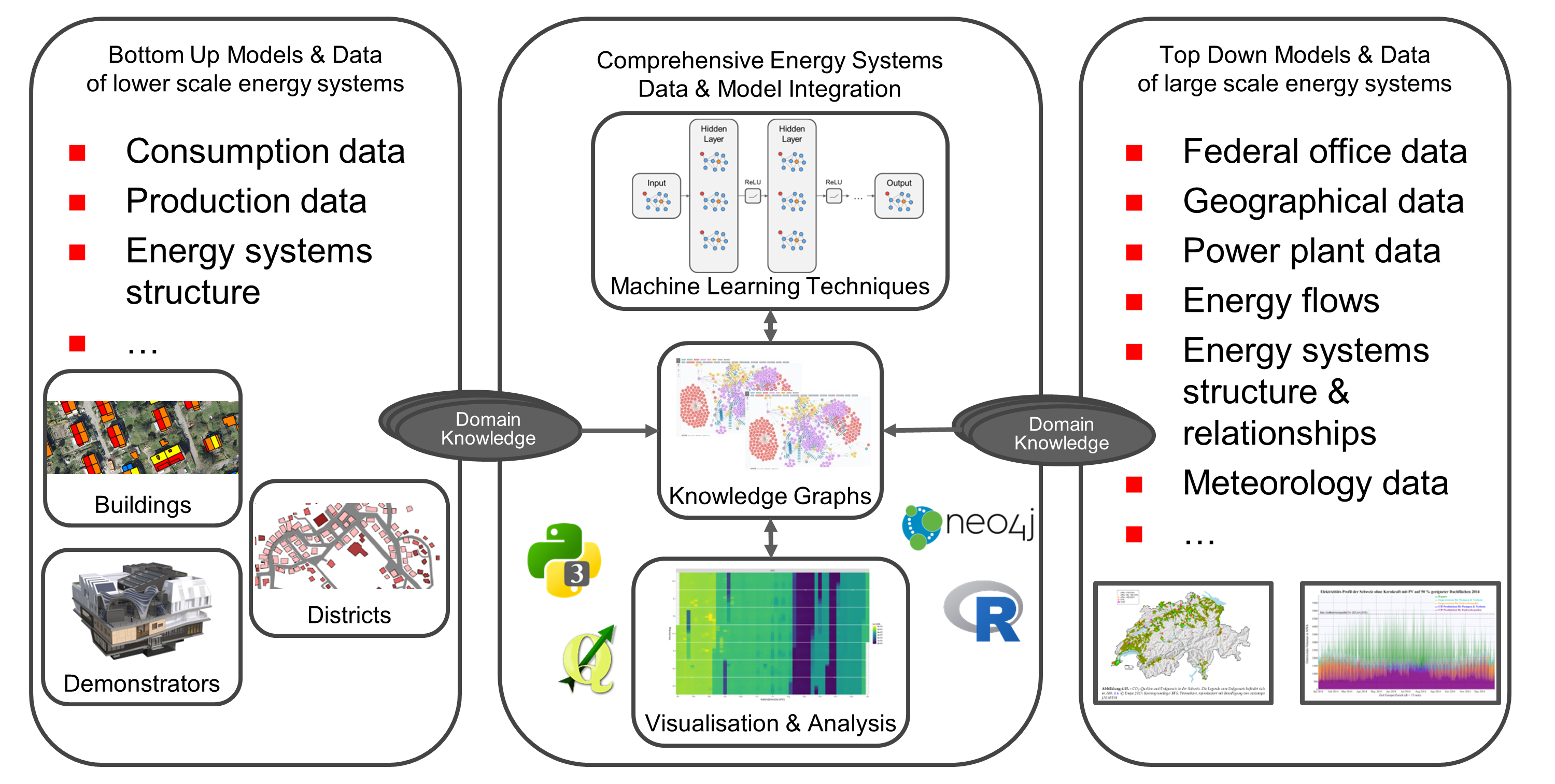Energy Systems Impacts
Energy systems describe the techno-socio-economic interactions and relationships between the production, consumption, storage, transformation and distribution of energy in the different forms of electricity, heat and fuels. In this research area we focus on better understanding these energy systems. In particular, we investigate the impacts and interplay of different technologies (e.g. solar PV, electricity based mobility, hydrogen storage, etc.) with current and future energy systems and vice versa. Due to the different scales (buildings, districts, cities, regions, countries) of energy systems, we apply both top-down and bottom-up approaches. With a bottom-up approach we utilize our group’s expertise of district and building energy systems modelling, while for top-down approaches we rely on a large variety of data and models from other domains (meteorology, hydrology, economy, ecology, geography, sociology, etc.). Due to the high spatial and temporal complexity of the challenges in the energy systems, we apply tools from geographical information systems (GIS) along with data-driven (statistical & machine learning) and physical models.

Figure 1: Schema visualizing how the Energy Systems Impacts Research is linked to other areas of the Urban Energy Systems Laboratory.
current projects
Publications
- Potentialanalyse Power-to-Gas in der Schweiz
SL Teske, M Rüdisüli, C Bach, TJ SchildhauerReport. Empa (Dübendorf) & Paul Scherrer Institut (Villigen PSI)
-
Impacts of an increased substitution of fossil energy carriers with electricity-based technologies on the Swiss electricity systemM Rüdisüli, SL Teske, U ElberEnergies 12 (12), 2399
- Benchmarking cooling and heating energy demands considering climate change, population growth and cooling device uptake
R Mutschler, M Rüdisüli, P Heer, S EggimannApplied Energy 288, 116636
- Power-to-X: Perspektiven in der Schweiz: Ein Weissbuch
T Kober, C Bauer, C Bach, M Beuse, G Georges, M Held, S Heselhaus, ...ETH Zurich
- Prospective life-cycle assessment of greenhouse gas emissions of electricity-based mobility options
M Rüdisüli, C Bach, C Bauer, D Beloin-Saint-Pierre, U Elber, G Georges, ...Applied Energy 306, 118065
- The potential of vehicle-to-grid to support the energy transition: A case study on Switzerland
L Di Natale, L Funk, M Rüdisüli, B Svetozarevic, G Pareschi, P Heer, ...Energies 14 (16), 4812
-
Simulating spatiotemporal energy technology adoption patterns under different policy designsF Heymann, P Duenas, FJ Soares, V Miranda, M Rüdisüli2021 IEEE Madrid PowerTech, 1-6
-
Quantification of existing rooftop PV hourly generation capacity and validation against measurement dataA Walch, M Rüdisüli, R Castello, JL ScartezziniJournal of Physics: Conference Series 2042 (1), 012011
-
Spatiotemporal upscaling errors of building stock clustering for energy demand simulationS Eggimann, N Vulic, M Rüdisüli, R Mutschler, K Orehounig, M SulzerEnergy and Buildings 258, 111844
-
Decarbonization strategies for Switzerland considering embedded greenhouse gas emissions in electricity importsM Rüdisüli, E Romano, S Eggimann, MK PatelEnergy Policy 162, 112794
-
Performance benchmarking of power-to-gas plants using composite indicatorsF Heymann, M Rüdisüli, F vom Scheidt, AS CamanhoInternational Journal of Hydrogen Energy 47 (58), 24465-24480

-
Share
